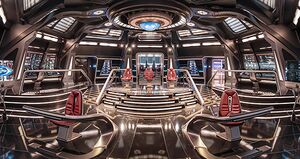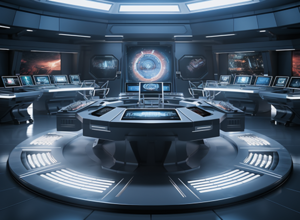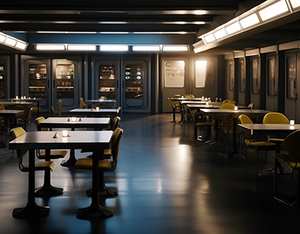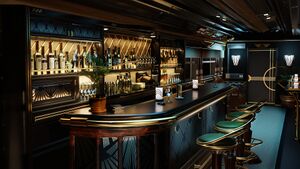USS Endeavour
- "The arching sky is calling"
- —Robert Heinlein - Ship's Dedication Quote
The USS Endeavour (NCC-91895) is a Constitution III-class starship assigned to the Fourth Fleet and Endeavour Squadron under the command of Commander Karana Valance. Commissioned in early 2400, Endeavour was built from the parts of her decommissioned predecessor, a Manticore-class, and reformed into something new: a symbol of Starfleet’s spirit of cooperation and exploration.
Since early 2401, she has been assigned to the Midgard Sector, basing her missions out of Gateway Station. A border region adjacent to the old territories of the Romulan Star Empire and Neutral Zone, Endeavour now seeks to reach out to those abandoned by the collapse of the empire, forge new friendships, and explore this newly-independent expanse. Refugees need Starfleet aid, worlds no longer under the rule of Rator or Romulus need welcoming to the galactic family, and vast stretches of the unknown must be explored. But the region is still volatile and dangerous, a breeding ground for criminals and warlords. Not everyone will look fondly on the Federation’s arrival, and many will have a right to be left alone. Walking the line between reaching out and interfering, between exploring and trespassing, between helping and imposing, is a tall challenge for Endeavour in this new era of Starfleet’s efforts to reach back out to the galaxy.
If duties take Endeavour and the squadron beyond the sector, she acts as the flagship, the formation’s command leading from her decks. This may be in emerging crises, challenges for which her crew are best-suited, or simply at the directive of Fourth Fleet Command. But wherever she goes, above all, Endeavour’s duty is to bring the Federation’s torch of hope and discovery to a shrouded frontier.
Since her commissioning, Endeavour has performed key duties in some of the most notable incidents of the dawn of the 25th century, from responses to the Century Storm, to the stabilisation of the Velorum Sector during the fall of the Romulan Star Empire, to the Blood Dilithium crisis of the Gradin Belt and the Lost Fleet's invasion of the Deneb Sector.
Design and Layout
See: USS Endeavour Deck Listing
When the Manticore-class USS Endeavour was decommissioned, Starfleet ordered the hulk to be used to construct her successor. Like many ships of her class, the Constitution III-class Endeavour is thus built using much of the hull, internal systems, and computer of her predecessor. This has engendered a strong sense of continuity, especially with many of the crew carrying over service across both ships.
The Constitution III emerged as Starfleet's era of designing for comfort and luxury was waning, but Endeavour is still expected to act as a beacon of the hope the Federation can bring to a fraught region of space. Her interior matches the more utilitarian feel of many of her class, with more polished metals, uncarpeted decks, and cooler colours on the fixtures. She is by no means cold or unwelcoming in design, however, and is built with the expectation the crew may live aboard for months at a time.
With most quarters consisting of only one room, Endeavour relies on communal facilities for the crew to mingle and enjoy time off; most decks offer at least a small observation lounge for relaxing and socialising, and the ship has multiple mess halls of varying sizes. Most of these are somewhat utilitarian, with only the main lounge expected to field visitors. The mess hall near Main Engineering, for example, is one of the more stark and 'rough and ready' break spaces aboard.
Bridge
The Constitution III-class's aesthetics intentionally harken back to Starfleet's golden age of exploration, and Endeavour is no different, blending traditions with modern innovation. The bridge is designed to be visually impressive for crew, visitors, and those communicating by viewscreen. As with much of the ship, the decks are polished steel and the fixtures cool metals.
Endeavour's bridge has three central chairs, rather than one command chair. The chair to the CO's right is reserved for the executive officer, while the left is a space for guests or mission advisors. Facing the captain's chair from the viewscreen, the helm officer is seated at the front-left with the operations officer at the front-right, while the science station is in the alcove on the far left with tactical in the alcove on the far right. The communications officer's post is at the rear right, between the door to the conference room and the turbolift, while the opposite station on the left is often used by mission advisors or to monitor secondary operations such as away teams or auxiliary craft.
Strategic Operations Centre
At Captain Rourke's behest, facilities akin to the Combat Information Centre aboard Endeavour's predecessor were installed aboard. Designated as the Strategic Operations Centre, the SOC can provide an information and analysis hub supporting mission objectives beyond merely military, and including economic and political. From the SOC, staff have an overview of a region on the holographic interface and can monitor changes and plan operations. This positions Endeavour for data gathering and analysis operations across multiple systems and locations, be they focused on strategy, intelligence, or science.
With the multi-mission nature of the ship, the SOC sees extensive use as a mission planning centre during diplomatic operations with multiple local concerns, such as security or humanitarian support. With Endeavour's regular long-term operations in a single area, the SOC facilitates the Chief Intelligence Officer's work to maintain records and build up actionable knowledge to support missions. It also often sees use by the civilian and Starfleet diplomatic staff when liaising.
If the squadron is deploying away from Gateway Station, the SOC acts as a command centre for the squadron leader and their staff. This provides operational space away from the bridge and allows the command team to conduct strategic analysis and issue orders to the squadron at large.
The Safe House
There are several messes and lounges aboard Endeavour, offering space for the crew to socialise, relax, eat and drink. Most are built in the same standard design as the rest of the ship. An exception is the Safe House. The main lounge and bar aboard Endeavour, it acts not just as a leisure space for the crew but hosts gatherings with guests that could include diplomats and dignitaries. It has been designed for comfort, with gentle lighting and brightly-coloured upholstery to soften the utilitarian feel of much of the ship. Seating is a mixture of comfortable booths that can provide limited privacy or even intimacy, and tables on the main floor that are cleared away when more space is needed.
The Safe House can swing between an atmosphere of a bustling party to a more intimate buzz, but the nature of the Starfleet life and crew shift patterns means it always feels like a place to catch up over bar snacks and a drink, or at least a coffee.
The Round Table
The officers' mess on Deck 7 has been named the Round Table. Reserved for the exclusive use of senior staff, other ranking officers, and their guests, it has been designed for a close, intimate feel for small gatherings or one-on-one meetings. It is furnished in blacks, golds, and greens in an art deco style. Seating is at the bar or one of the narrow booths, and refreshments are provided by the bar staff. This includes replicated fare, but several of Endeavour's officers have stocked the bar with drinks from their personal supplies with varying levels of generosity. It is a preferred place for officers seeking a quiet drink, a private conversation, or a getaway from the hustle and bustle of the ship. On occasion, it is reserved by the captain for gatherings exclusively for the senior staff or his guests.
Auxiliary Craft
Some of the auxiliary craft from the previous Endeavour were recovered, and Rourke retained and expanded the naming conventions of before, shuttles and runabouts named after the mythical court of Camelot instituted originally by Captain Leonidas MacCallister. Rather than retain the full complement of shuttles for a Constitution III, a quartet of fighters have been installed, deployed for ceremonial escort duties as much as patrol and scouting missions.
Type-14 Shuttles
Twelve of the auxiliary craft aboard are Type-14 shuttles, the standard for most Starfleet ships. With only a flight crew of one or two officers, they struggle to fit even an additional four personnel aboard. Despite this, they are capable of reasonably long-distance missions. With other, larger auxiliary craft aboard, the Type-14s are usually reserved for simple ferrying or survey duties.
- Galahad
- Lancelot
- Bedivere
- Percival
- Gawain
- Tristan
- Agravain
- Dagonet
- Bors
- Sagramore
- Ector
- Kay
Orion-class runabouts
The two Orion-class runabouts are the 'mid-weight' auxiliary craft for Endeavour. With a flight crew of only three, they are reserved either for long-range missions for only two to four crew where its bunk space and facilities will be needed, or significant survey or away operations close to home making use of the resources without relying on Endeavour herself.
- Uther Pendragon
- Merlin
New Atlantic-class runabouts
Endeavour's two New Atlantic-class runabouts are the vessels of choice for major away team operations. They see heavy use for missions taking the crew far from the ship, and are particularly favoured for use by the Hazard Team when transporters are inadequate. The different modules make them highly-flexible in their deployments, though both runabouts have the scouting modules installed as default. The King Arthur in particular has a long history with Endeavour's crew, recovered from the ship's predecessor and playing a major role in many missions.
- King Arthur
- Guinevere
Captain's Yacht
The Prydwen is the captain's yacht, reserved exclusively for use by Captain Valance. A large, warp-capable craft, it is intended primarily for diplomatic duties where it is appropriate for the commanding officer to travel in person and 'fly the flag.' It includes a comfortable state room for the captain, two small bunkrooms for pilots and security personnel, a mess and break room for the crew, and a function room that can serve for diplomatic duties of hosting meetings or dinners.
Despite its primary purpose in diplomacy, because it is likely to host significant dignitaries - and the ship's captain - the Prydwen is well-armed, well-armoured, and notably fast even for a craft of its size.
Valkyrie-class starfighters
Several of the shuttles included in a standard Constitution III complement were removed to make space for a flight of four Valkyrie-class starfighters. While they are tactical vessels, Captain Rourke brought them aboard to also serve a ceremonial role in diplomatic affairs, and for their high speeds and sophisticated sensor arrays rendering them suitable for initial, simple reconnaissance in potentially fraught regions. The 'Black Knights,' as the flight are called, consist of four permanently-assigned pilots, all of whom also fulfil departmental roles as relief flight control officers or shuttle crew. If the full flight is deployed beyond a single shift, such as in cases of emergencies or in the rare occasions when a Combat Air Patrol needs maintaining, other flight control officers trained to pilot a Valkyrie are seconded.
Because of the ceremonial role of the Valkyries, where they often fly escort for diplomatic craft in a role that sometimes includes providing security, the craft themselves are kept in peak visual condition, while the pilots train regularly for complex formation flying.
History
The Manticore-class USS Endeavour was sabotaged at the hands of the Romulan Rebirth Movement and decommissioned in late 2399, her power grid deemed too badly damaged to be salvageable. At the order of Admiral Alexander Beckett, Starfleet altered the construction order for a new Constitution III-class ship, which was originally to be commissioned as the Constellation. The Constitution III-class is often built with components salvaged from older ships, and with many components of the old Manticore intact or repairable, her hull was dragged to Avalon Fleet Yards to complete the final stage of construction. It seemed only appropriate for the new ship to instead be named Endeavour, commissioned in honour of both her immediate predecessor whose components she bore, and the original Constitution-class starship of the 23rd century.
This allowed Endeavour's construction to be completed very rapidly. The original ship had been considered for diplomatic operations in the Romulan Neutral Zone, and Admiral Beckett argued that a vessel of the same name adopting the same duty would send a firm message to those who had sabotaged her that Starfleet would not be stopped so easily. The surviving crew of the previous Endeavour were assigned to the new ship, including commanding officer Captain Rourke, and further personnel selected to bolster her ranks.
In early 2400, Endeavour entered the Romulan Neutral Zone to begin relief missions. Early on this included cooperation with both the Romulan Star Empire and Republic in establishing relations with the more self-sufficient independent worlds, from the mining planet Nerillian to the trading hub Meldesa. For months, the presence of a Starfleet ship and a formal diplomatic mission made extensive in-roads in a region historically suspicious of Federation intervention. Unprecedented access to the RNZ led to new discoveries, with Endeavour's Archaeology & Anthropology team discovering the wreck of Koderex, a Romulan archive ship lost during the exodus from Vulcan, and whose data libraries held an untold amount of knowledge.[1]
Stormbreaker
Endeavour formed part of the response to the Century Storm, slews of starships entering the beleaguered Paulson Nebula to assist in evacuation or curbing the storm's effects. Endeavour was dispatched to the Whixby system to shield the Betazed colony there and convince them to bring in the vast number of local refugees, something the planetary government was highly reluctant to do. This mission followed in the footsteps of the USS Odysseus, which had gone missing nearby. The Odysseus was found to have been trapped in a nearby subspace rift, one of the phenomena causing the Century Storm. An away team managed to board the Odysseus and found inding the ship splintered across space-time, but managed to rescue almost the entire crew - some found dead by the ship's hardships, while commanding officer Commander Aquila remained aboard to allow her crew to escape as the rift closed around the ship, which was then destroyed. At the same time, Endeavour successfully shielded Whixby from a new storm front, saving tens of thousands of lives, and convinced the local government to take in thousands of local refugees.
The refugee base on Whixby transformed local relief operations. Evacuation teams could secure the populations of planets that could not be shielded and transport them to a much closer place of safety, allowing them to engage in more and more such rescue missions. Data secured from the rescue of the USS Odysseus's crew gave Fourth Fleet Science extensive new information on the subspace rifts responsible for the Century Storm, hastening efforts to end it.[2] Once the operation ended, multiple members of Endeavour's senior staff were commended for their roles.[3]
Sundered Wings
The outbreak of civil war in the Romulan Star Empire of Rator in mid-2400 sent Endeavour to the Agarath System, an industrial hub of the Reman-dominated Velorum Sector seeking independence. After driving off an initial Star Navy invasion, Endeavour set to support and protect Agarath against future incursions. Diplomatic and security staff delved into local stability in a system with huge rifts between former Romulan civilians and former usually-Reman slaves and labourers, attempting to shore up negotiations to establish a new government under the leader of the Agarath uprising, a former Reman Commando named Hiran. Meanwhile, tactical officers prepared Agarath for another attack by the Star Navy, building up regional defences and trying to train and prepare the local Agarath Guard for combat.
The Battle of Agarath was difficult and bloody, and one of the heaviest battles of the Sundered Wings operation. Preparations meant the defenders met the Star Navy's incursion head-on and hammered them quickly, bringing Star Navy strike force commander Lotharn to a negotiation table relatively swiftly. But it was at this point that a band of Klingon warships, part of the incursion into Romulan space by renegades from the Klingon Houses, struck both sides, taking them by surprise. A roiling three-way battle dragged out for a time, with several Agarath leaders killed, including acting-Governor Hiran. Only once Captain Rourke, trapped on previously-neutral ground of a defunct Agarath mining station to negotiate with Romulan Commander Lotharn, had killed the Klingon warband's leader did he convince Lotharn to join forces with him to protect even former Romulan subjects from slaughter.
Starfleet and Romulan forces rallied to repel the Klingon forces, continuing to take heavy losses. This prompted Star Navy Commander Lotharn to signal the withdrawal once the dust had settled, leaving Agarath to its self-governance. Endeavour remained to facilitate the arrival of Romulan Republic representatives, coming to help the stabilisation of Agarath under its new leadership of an uneasy blend of Reman workers and Romulan former rulers, before returning to its duties in the Neutral Zone.[4]
Late 2400
Shortly after the fall of the Star Empire, Endeavour encountered forces from an alternate universe, enemies many of the crew had faced some years prior who had been suspected trapped in this reality. While these enemies were dispatched, believed either returned to their own reality or even destroyed in their effort to get home, this came with a price: the discovery that one of their own, Lieutenant Dathan, had long been an agent from this alternate universe. While Dathan ultimately sided with the crew of the Endeavour, saving them at apparently the cost of her own life, this had undoubtedly been an egregious failure of security. With even Vice Admiral Beckett implicated as possibly negligent, Captain Rourke's standing was dealt a heavy blow which would have implications later.[5]
Soon after, the outbreak of Blood Dilithium in the Delta Quadrant brought Endeavour among the ships travelling through the Barzan Wormhole to respond to the humanitarian crisis. Studying the effects of this mineral led Endeavour to discover the existence of ancient Vaadwaur technology that could harness it to cause untold damage to telepathic populations, technology the Devore Imperium were hunting. Endeavour successfully interceded, destroying the technology and saving the lives of a Brenari colony under attack.[6]
This did not prove enough to restore the crew's standing in the eyes of Starfleet, however. Upon returning to the Alpha Quadrant, Endeavour was reassigned to a squadron under the command of Fleet Captain Jericho. This stripped the ship of its duties as a base of diplomacy in the Neutral Zone, with the unit primarily focused on maintaining stability along the Federation border with the Romulan Factions and the Klingon Empire.[7] Under Captain Jericho's command, Endeavour and her sister ships were ordered to prioritise security, protecting Federation citizens from threats among renegade Romulan and Klingon elements such as the Romulan Rebirth Movement and the House of Mo'Kai.[8]
Lost Fleet
The invasion of the Dominion Lost Fleet in the Deneb Sector in 2401 saw Endeavour rally to respond alongside her squadron and the Fourth Fleet. The squadron was assigned to liberate the planet Izar, the oldest and most populous colony in the frontier, whose billions-strong populace had fallen under Dominion occupation. Despite the magnitude of opposition, tensions between Captains Rourke and Jericho reached a fever-pitch in the campaign's early stages. Given an opportunity to aid Cardassian allies of a Breen ambush, Jericho refused to split the squadron or break comms silence lest it impede their advance on Izar; bitterly disagreeing, Rourke disobeyed orders and directed Endeavour to rescue the Cardassian strike force.
Upon the squadron's reunion, Rourke was relieved of command by Jericho, who placed one of his own officers, Lieutenant Commander Krish Malhotra, in command despite his inexperience or the presence of other, more experienced officers. Endeavour joined the rest of the squadron in the Battle of Izar, though it became quickly apparent the squadron had been betrayed, with enemy forces stronger than expected and their ships dispersed. Fearing the battle was lost, Captain Jericho ordered Triumph on an attack run against the enemy, and for Endeavour to salvage essential combat data, retrieve survivors from the disabled Nighthawk, and leave. A panicked Commander Malhotra attempted to immediately flee, and was relieved of command by squadron Strategic Operations Officer Harrian Cal.
The Battle of Izar was salvaged by the arrival of reinforcements, including the rest of the squadron and the rescued Cardassian strike force, led by Matt Rourke. But soon after Izar's liberation, word came of the Lost Fleet's final push against Farpoint Station. Captain Jericho upheld the arrest of Captain Rourke, arrested Commander Harrian for mutiny, and dispatched Endeavour to Farpoint not under Malhotra's command, but under the leadership of Endeavour's former XO, Karana Valance. At Farpoint, Endeavour conducted herself with distinction, receiving several unit commendations.[9]
Midgard
In the aftermath of the Lost Fleet Crisis, Fourth Fleet Command ordered an inquiry into the squadron's breakdown of command. Commander Karana Valance was ordered to proceed with Endeavour back to the Romulan border and report at Gateway Station. With Captain Rourke's professional fate unclear, Valance was offered permanent command of Endeavour. In accepting it, she accepted the ship's new mission: not merely to uphold stability on both sides of the border, but to conduct new exploratory missions into territory once forbidden to Starfleet.[10]
Notable Crew
Commanding Officers
- January 2400 - April 2401: Captain Matthew Rourke
- April 2401 - Present: Captain Karana Valance
References
- ↑ https://bravofleet.com/mission/43276
- ↑ https://bravofleet.com/mission/47527
- ↑ https://bravofleet.com/story/52633
- ↑ https://bravofleet.com/mission/54006
- ↑ https://bravofleet.com/mission/58751
- ↑ https://bravofleet.com/mission/64628
- ↑ https://bravofleet.com/mission/69369
- ↑ https://bravofleet.com/mission/74098
- ↑ https://bravofleet.com/mission/76845
- ↑ https://bravofleet.com/mission/83575



